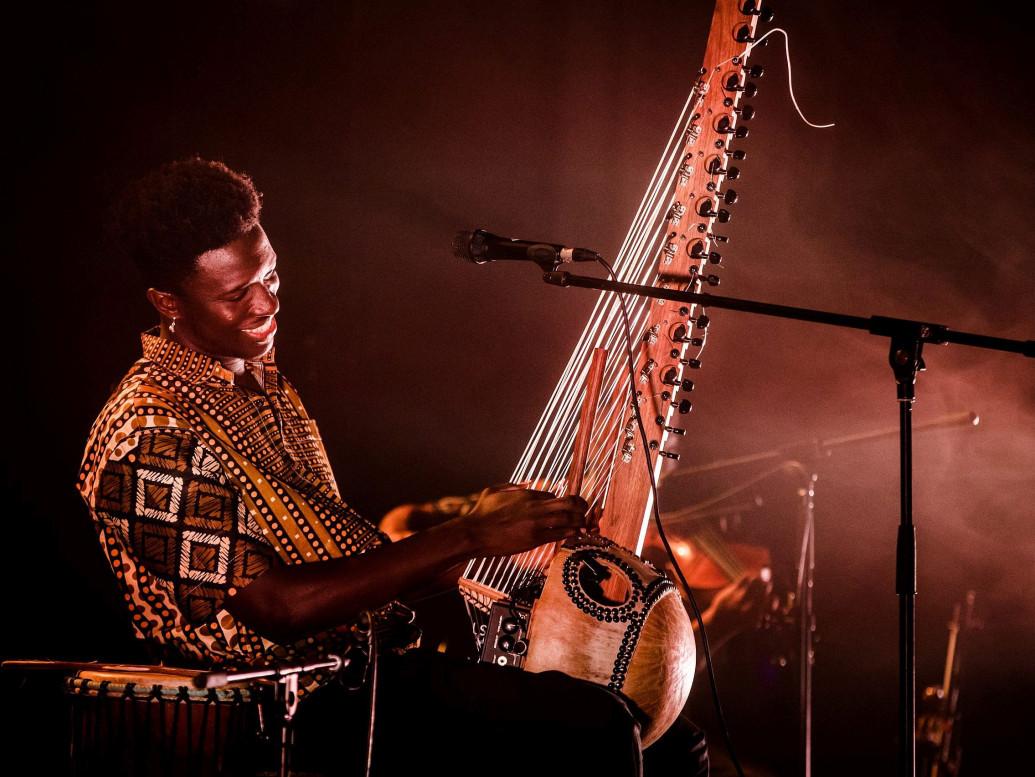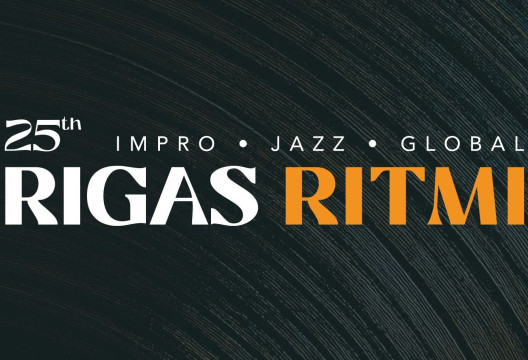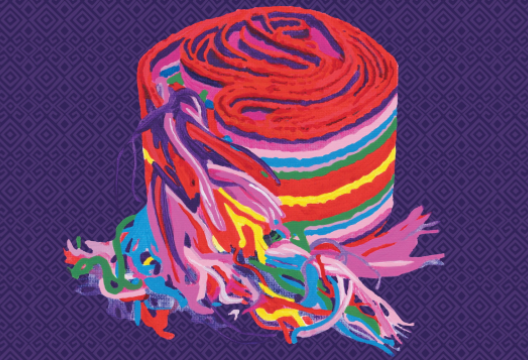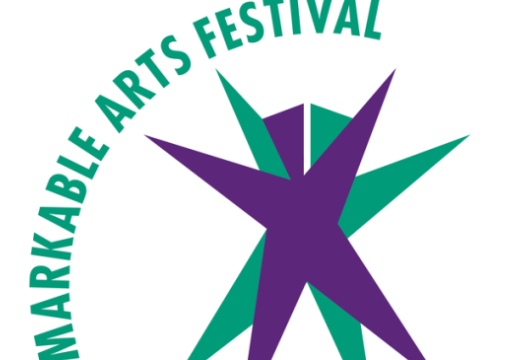On July 4, Riga Cathedral Garden will be filled with heartfelt songs of West African people, as the new global music star Momi Maiga will perform at the Rīgas Ritmi Festival, which is celebrating its 25th anniversary. Momi Maiga is a Senegalese singer and kora player, who has added European folk and even classical music influences to African musical traditions in his work.
We caught up with Momi Maiga, who now lives in Catalonia, Spain, and will be visiting Latvia for the first time.
Your main highlight is your second album Kairo, which was released in the fall. How would you describe it, how does it differ from your debut album Nio?
It’s like a continuity. We are going the same way, because when I did my first album Nio people really liked it. With the second one I didn’t want to change something a lot. I decided to follow the same style.
The album features an unusual combination of gently flowing West African music and European folk and even classical music influences. How did this combination came about?
I always love to do a fusion of my culture with other ones. When I came to Spain and started to listen and learn about the music around, I just took it and tried to do something like a fusion with everything involved – flamenco, a little bit of jazz, classical music, folk.
Can you really play flamenco with kora?
Yes! In my first album there is a song called Mansani. It’s a traditional song of my culture from kora repertoire. I mixed it with buleria (fast flamenco rhythm – ed. note) and recorded it together with really good flamenco guitar player called Pau Figueres. And for the second album I did a song called Mbolo. It’s a little bit like Mansani, a little bit of doing this fusion of flamenco and my culture’s music again.
Were the Spanish guys surprised of you playing the flamenco?
Yes! But I got really good feedback. It’s not so easy because usually flamenco people are really strict purists. It went great.
You come from the musical Cissokho family, known for popularising West African culture for centuries. Did you have a choice not to sing or play kora?
I think that in my case I really had the choice because I have many cousins who doesn’t play kora and sing. But before it was an obligation if you have been born in this family of musicians. The normal thing was that you had to follow these rules. Now it’s quite free and you can choose your own way. I chose it because I love the kora. I was playing it when I was six years old already. I love music and I love singing. It was my destiny but I chose it myself. I am really happy about it. And honored to keep doing these ancestral things that my family members have been doing for centuries.
It seems that it’s not the easiest instrument to play, especially at the start. I heard that you had a specially built smaller version of kora for you when you were a kid.
I had a smaller version but with 22 strings anyway. People usually are saying that it’s complicated instrument because it has too many strings, but for me it’s like all the other instruments. Saxophone seems very complicated for me. As with any other instrument with kora you just have to play to keep learning it, to know more and more about it. The kora has less strings than the harp! It’s not the most difficult instrument. For me it’s really easy one. When you tune it very well, you just start playing it and the sound is really great already. It’s not the saxophone with which you really have to know how to make the sound out of it.
But possibly you must practise kora playing for a few hours a day anyway.
Absolutely! It’s always like that with the instrument. I can not leave the kora aside for days.
Do you also perform with your relatives, such as your cousin Seckou Keita, who is a well-known kora player in the world of global music?
Yes, we did a concert at the festival called Black Music Festival in Girona. The director of the festival proposed us to do a kora duo. It was really nice and I hope we will do it again.
It is interesting that ten years ago you started your professional career with a band from Sweden – Ale Möller Band. How did that happened?
That happened because my mother have really good contacts in Sweden. Our musicians got to play there and then Ale Möller came to play in Senegal with his band. And he needed a kora player. I was already playing it so my mum said – are you good to go to play with Ale’s band? It was like – wow! It was like a dream coming true. I never played kora in the concert before. I only played percussion when my uncles were playing kora. I accompanied them. So, it was the first time when I played kora with the band.
It was really a fun from the very beginning or you was stressed-out about it at first?
No, it really came very naturally because for me, coming from this family of musicians, doing music is like a really natural thing. It was pure joy and such a wonderful experience to have.
That sounds great. And afterwards that took you to a new home in Catalonia, Spain. How you got there?
I was invited by the Museum of Music of Barcelona. I did a masterclass at the music conference in the museum. And I am living in Catalonia now because I have a girlfriend from here for seven years already. I chose to stay here because it’s a really a great place to live in. It’s not very cold and not very hot. And also I really like the culture around. It’s very rich. Iberian music, flamenco, jazz, all kinds of music that people are playing. Barcelona is full with music. It is inspiring and very helpful for me as an artist.
But you sing mostly in West African languages – Wolof and Mandinka. What are your songs about?
Let’s say they are about the values. The family I come from always has sang about the main values, about things that can help people in the real life. Education, respect, mother, father et cetera. It is our role in the society. I keep doing this in my music.
Is there a huge difference between Wolof and Mandinka languages? Especially sonically, if we are talking about music, about singing?
The languages are really different. The Wolof has an Arabic influence. It’s not really obvious but it is there. Mandinka is totally another thing. There is no Arabic influence and I think that it’s better for singing. Maybe I am saying that because it is my mother tongue but it is a very nice language to sing.
Does your kora have a name?
My kora? Not yet! Maybe people can give it a name. Otherwise kora is kora around the world. Mali people also call it kora. I am playing the same instrument now for three years but soon I will have another one because it’s never enough.
Guitar players are chaging the instruments during the concerts. Is it the same with kora players?
You can do it. It depends on the artist. I was playing with two koras before, but it’s complicated when we are travelling. That’s why I decided to play with one instrument for practical reasons. Otherwise you can play with two koras. Tune one in one tuning and the other one in another and change them between songs. That is a good idea if I have to play in Catalonia and not travel too far.
What is the best thing about this instrument?
I think the best thing about this instrument is that it can cure you. It’s like a good medication. If I am sad or a little bit angry, when I start to play the instrument, the kora makes me breathe deeper and become calm. It helps me to be me. It’s a medication and a meditation also. It’s really deep and really magical. When I am playing the kora it is like going somewhere very deep inside.
And that’s why it sounds so good.
Thank you so much!
You will perform at the Rīgas Ritmi Festival with percussionist Aleix Tobias, violinist Carlos Montfort, and cellist Marçal Ayats. Do you perform a lot together?
Yes, we perform a lot. With the Nio album we did approximetely 90 concerts. I always play with them. It’s like my official quartet. They are really great musicians and great persons as well. I always enjoy time with them. And it’s not just about playing. It’s always good vibes on stage and off stage. They give me a lot of good things for my music, a lot of ideas and I am really happy that we continue to play together.
A violin and cello is an interesting combination in one band with kora. It could be a surprise for listeners seeing your quartet for the first time.
It is! I chose to do it like that because the cello can do some melodies but it can play bass lines at the same time. And violin is a really nice, melodic instrument and it sounds very great with some effects added. And Aleix Tobias is crazy. He’s an amazing percussionist, very sensitive when playing the music. He don’t have like a “normal” drums. He made his own set and it sounds really, really good and match really well with my music.
There’s no guitar though. Would it be a clash between kora and guitar to have them both during the whole concert?
No. The guitar could be there. They sound together really well.
There’s this great album which came out last year by Malian kora player Ballaké Sissoko and South African guitarist Derek Gripper where they’ve found a common language without any written notes, just playing and talking to each other through music.
Exactly! This is amazing. It’s the magic of aural tradition. Listening and reacting with your instruments. This is really magical.
Maybe it’s even deeper talking than the verbal one.
Exactly! I agree.
So, let’s finish our talking as well then with the last question – what musical journey will you take the Riga audience on?
The audience will see another way of playing the kora – with classical instruments and very special drums. There will be a fusion of a lot of things and also good melodies. So, I think they will like it and we will share a good energy between us!
And your music with classical instruments involved should sound very good in the festival concert because it will happen at Riga Cathedral Garden in a very nice medieval type surroundings.
Wow! I love these kinds of places, it’s really magical to play in such surroundings. I am really happy that we’ll gonna play in this place in Riga. I want to come straight away!
Music journalist Kaspars Zaviļeiskis




